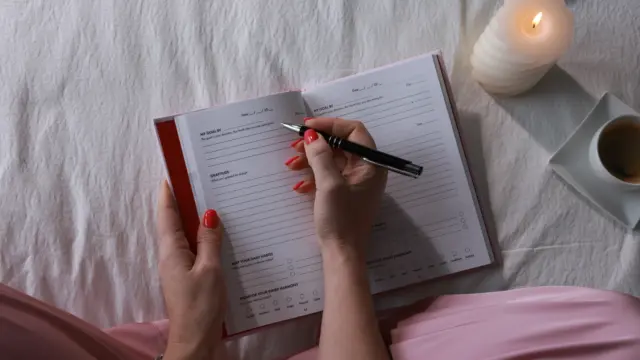Stress has become a constant part of modern life. Between deadlines, responsibilities, and endless notifications, it’s easy to feel mentally overloaded. But one simple, accessible practice can help you manage stress effectively: journaling.
Journaling isn’t just writing down your thoughts — it’s a proven method to process emotions, reduce anxiety, and regain clarity. Even a few minutes a day can make a measurable difference.
When stress is driven by persistent worry or anticipation, understanding what is anxiety can clarify why the mind struggles to settle and how journaling supports calm.
If you want a complete guide to building a journaling practice that supports calm, emotional balance, and long-term mental well-being, explore my full guide on The Ultimate Journaling Guide. It will help you create a grounding routine that reduces stress, clears your mind, and brings you back to yourself.
Why Journaling Works for Stress Relief
Journaling creates a safe space to unload your thoughts, reflect, and make sense of what’s happening in your life. When you write, you move worries from your mind to paper, which helps you detach and see things more clearly.
Studies have shown that regular journaling:
- Lowers cortisol levels (the stress hormone)
- Improves emotional regulation
- Helps you identify thought patterns causing stress
- Increases self-awareness and problem-solving ability
- Improves sleep and overall well-being
It’s like taking a mental deep breath.
Different Ways to Journal for Stress Relief
There’s no one right way to use journaling to reduce stress. Here are a few effective methods:
1. Brain Dump
Set a timer for 5–10 minutes and write down everything on your mind without censoring. Let your thoughts flow freely. This technique helps clear mental clutter quickly.
2. Gratitude Journaling
Shifting your focus to what you’re grateful for calms the nervous system and promotes positive emotions. Even listing three things can change your emotional state.
3. Reflection Journaling
Write about your day — the good, the bad, the confusing. Processing events through writing gives you perspective and reduces rumination.
4. Prompts for Stress Awareness
Use prompts to explore the root causes of stress. For example:
- What’s currently draining my energy?
- What’s within my control right now?
- What would it look like if I approached this calmly?
When stress feels more persistent or shows up as tightness, overthinking, or a sense of being pulled out of the present moment, prompts designed specifically for anxiety can offer additional support. These journaling prompts for anxiety are gentle, grounded questions that help you slow racing thoughts, notice what’s happening inside you without judgment, and bring your attention back to the present without trying to “fix” anything.
When to Journal to Manage Stress
You can journal whenever stress arises, but these times work especially well:
- Morning: to start the day with clarity and intention
- Midday: to reset and regain focus
- Evening: to reflect and release the day’s tension before sleep
Consistency is more important than timing. Regular journaling trains your mind to process stress more effectively.
How the iAmEvolving Journal Helps You Stay Centered
The iAmEvolving Journal gives you a clear structure to reflect, express gratitude, and track your goals and habits — all of which support stress reduction. Instead of facing a blank page, each section guides you gently, helping you stay consistent even when life feels chaotic.
Over time, journaling with structure turns into a calming daily ritual that supports emotional balance and resilience.
Available here:
Not sure where to begin? Start with a simple reset — then continue when you're ready.
Journaling creates space between your thoughts and emotions, helping you release tension and regain clarity. Each word you write slows the mind and restores balance. To discover more ways to find calm through daily reflection, visit Journaling for Mental Health.



